Essay Day - "Louis Malle’s 'Damage,' Lars von Trier’s 'Melancholia,' and the Circularity of Transgressive Energy"
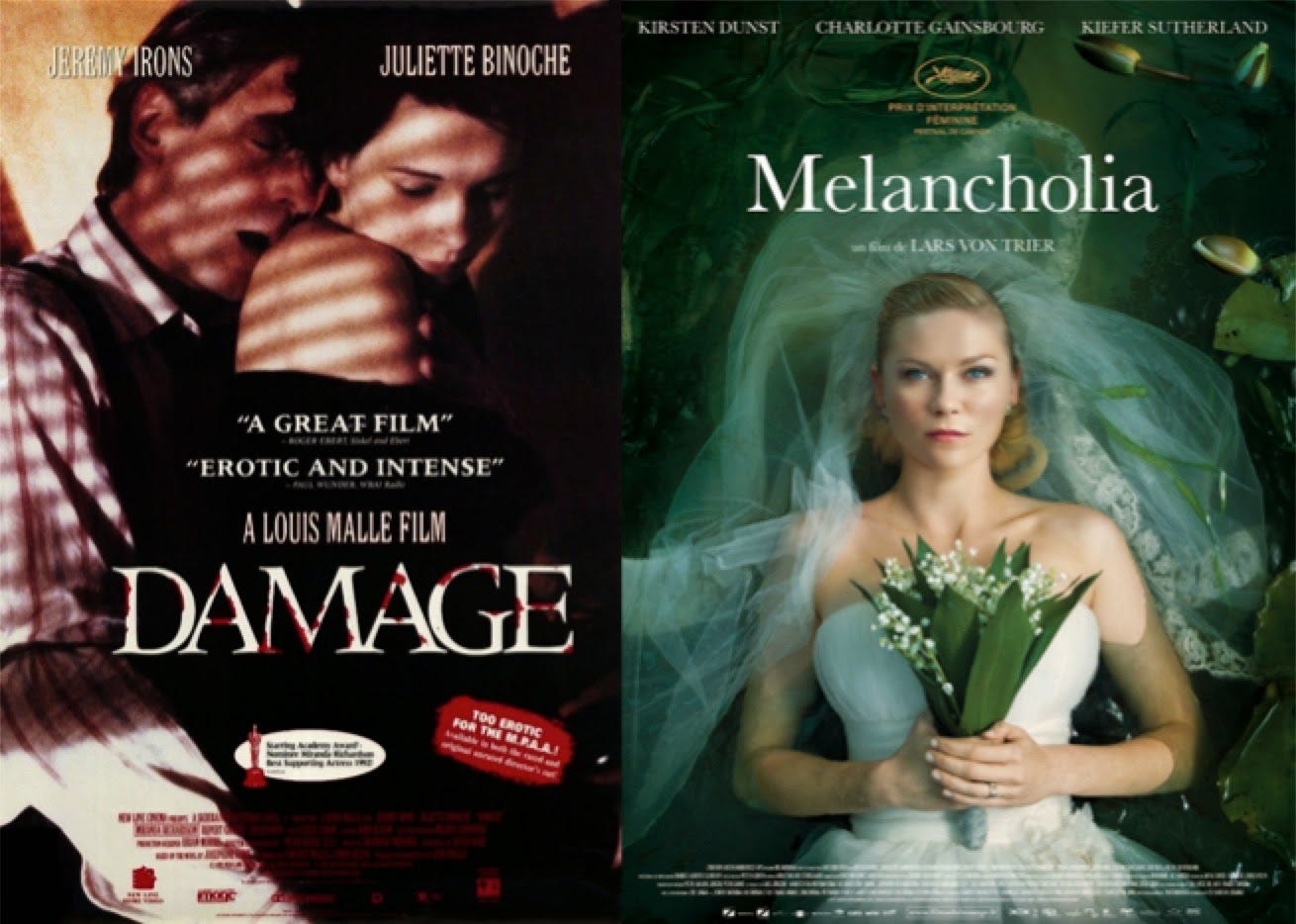
It’s Wednesday, which means it’s time for ‘Essay Day’ here at Fade to Lack. As explained here, I have written a large number of essays during my time at the University of Colorado as a student in film studies, and I thought it time to share the best of those with my readers, so throughout the summer, I’ll be posting a new essay every Wednesday, all focused on film in one form or another, but often incorporating other research and fields of study.
This week’s selection is one I never intended to be seen outside of a classroom setting, as it was written for an in-class exam in only one hour. But the Professor’s comments were very positive, even going so far as to suggest expanding the essay and submitting it to a journal. I haven’t had time to go to those lengths with it, but I thought the original version (lightly revised for publication) would be of interest to readers. The course was called ‘Cinema and the Poetics of Transgression,’ exploring issues of transgressive behavior in a variety of foreign feature films, and the essay prompt was, I believe, to use two films viewed in class – specifically, Louis Malle’s 1992 film Damage and Lars von Trier’s 2011 film Melancholia – and discuss the social transgressions explored in both. As this was written for an exam in a classroom setting, there is less of the usual shorthand plot synopsis for those who have not seen the films, so you may wish to seek them out before reading this, though it is not necessarily essential. Otherwise, enjoy...
Read “Louis Malle’s Damage, Lars von Trier’s Melancholia, and the Circularity of Transgressive Energy” after the jump...
In both Louis Malle’s Damage and Lars von Trier’s Melancholia, there is a clear separation between the protagonist and the world in which they live – that is, between the individual at the heart of the drama, and the bourgeois society wherein that drama takes place. The protagonist – Stephen (Jeremy Irons) in Damage, Justine (Kirsten Dunst) in Melancholia – are at odds with that society, either due to a lifetime of repressed sexual and emotional urges (Stephen), or a mental and emotional inability to understand the social status quo (Justine). This opposition between individual and society results, in both films, in a clear exchange of what we may call ‘transgressive energy.’ The repressions and disharmony in the hearts of the protagonists compel them to transgress against their bourgeois communities, and the bourgeois hierarchy, in turn, transgresses back upon the protagonist. This transgressive exchange is dual-layered in Damage (Stephen versus Society), and triple-layered in Melancholia (Justine versus Society versus the mysterious planet that ultimately destroys the Earth), but both films point towards a similar underlying message: A society that is too rigid to recognize or allow for the individual to thrive will be transgressed upon, and will likely return that transgressive energy in kind, subsuming and erasing the individual (Damage) or being subsumed and erased itself by further transgressive forces (Melancholia).
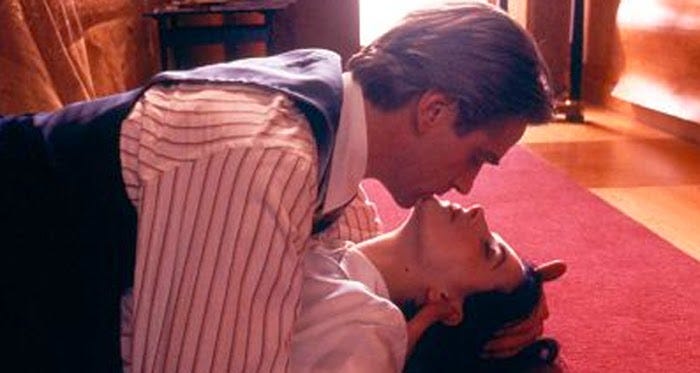
The British bourgeois society of Damage is defined by four key characteristics. First, and most obviously, there is repression: All the characters besides Anna (Juliette Binoche) display a fundamental inability to emotionally communicate with one another. Language is prominent throughout the film, shared and exchanged constantly, but little of actual value is ever said between people who are supposed to be ‘close.’ Stephen and his wife, Ingrid (Miranda Richardson), can communicate only through the same political language Stephen uses in his career, while Stephen’s son, Martyn (Rupert Graves), expresses late in the film how distant he feels from his father, even after spending a lifetime with the man in his life. Martyn and Anna are lovers – in the traditional, bourgeois sense of the word – yet they seem to know extremely little about each other. In short, all these characters and more are repressed, unable to communicate their feelings to those they supposedly love, and often unable to honestly admit their own problems and urges to themselves. The film’s dark and shadowy interior cinematography, which constantly expresses a sort of mournful isolation even when two characters share a frame, emphasizes these repressive aspects.
Second, the film presents strictly observed social rituals as core to the bourgeois experience. The extended dinner party scene of the film’s second half is an exemplar of this, clearly laying out the procedures for and limitations of bourgeois social interaction. Repression abounds in this sequence, and we are made acutely aware as the dinner and ensuing interactions go on that these social rituals are fundamental to maintaining repression as the status quo. As also glimpsed during Stephen’s family dinners early in the film, the bourgeois put stock in these arbitrary gatherings and rituals, thinking they provide meaning, when really, they only provide structure – and that structure, in turn, is profoundly limiting. Within these social rituals, we also observe the third characteristic: conformity. Characters in the film dress in a certain way, depending on their age, gender, and station in life, to conform to bourgeois social expectations; they play along with these rituals to more fully ‘conform’ to the societal mold; and they rarely speak out of turn, refusing to break step with the society’s rigid conformity. And that conformity, in turn, leads directly to the fourth characteristic, which is that of ‘performance.’ In social gatherings – even small, household dinners – people play a broadly expected ‘role,’ rather than expressing true individualism, and the film puts particular focus on the various roles Stephen plays. During dinners, he is the stiffly reserved patriarch; in public, he is the smart but reserved dignitary; and in one of the film’s most memorable scenes, in which he gives a televised speech on foreign affairs, he plays his role of the all-knowing ‘politician’ (a performance that is, as Ingrid notes, ‘excellent’).
When we meet Stephen at the start of the film, he has existed in this repressive culture his entire life, and his seemingly subconscious desire to rebel (or transgress) against it is palpable in his interactions with Anna, fiancé to his son Martyn. Without so much as a full conversation, he and Anna begin an intense sexual affair, and the sequence depicting their first tryst – Stephen gets a call, curtly agrees to something, and then visits Anna to make love – is brief to the point of being baffling. This is intentional. Stephen acts not on logic – which would, of course, tell him to continue conforming to bourgeois ideals – but is compelled, almost unconsciously, by the aforementioned ‘transgressive energy’ that is created by a lifetime of repression. There is an underlying desire in this man to be ‘individual,’ something bourgeois conformity does not allow, and in sleeping with Anna, he is, at least during their sexual encounters, ‘free.’ All four major characteristics disappear when he is with her; he is no longer repressed, because he speaks freely with Anna, and she speaks freely with him (consider the scene in which Anna shares her own story of adolescent trauma); he is no longer bound by social rituals, nor even social norms, and does not even need to conform to bourgeois sexual practices (rather than making love in the missionary position, for example, Stephen and Anna have rough, violent sex in all manner of places and positions); and perhaps most importantly, when he is with Anna, Stephen is no longer performing. He may not have a concrete understanding of his own identity, but when making love to Anna, Stephen is not assuming a façade.
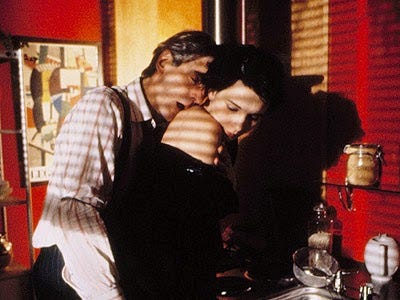
In this way, Stephen is directing his transgressive energy against the society that created it. Maintaining an affair with the fiancé of one’s son is, of course, patently unacceptable to a bourgeois culture, especially one as rigid as this, and whether he consciously intends to do so or not, Stephen is directly rebelling against that society every time he meets with Anna. Yet this flow of transgressive energy is not a one-way stream – what Stephen inflicts upon his society is inflicted back upon him tenfold, when Martyn discovers his father and fiancé making love, and is killed falling over a stairway rail in surprise. Once his transgressions are discovered, the bourgeois society quickly restores order – Stephen becomes an outcast, his wife (driven mad by grief) rejects him, and he is compelled to leave the country, isolating himself somewhere far away. In short, society redirects Stephen’s transgressive energy back upon him, ‘correcting’ the problem of this rebellious man by ‘erasing’ him, permanently, from that society; even though he is hugely prominent, Stephen is quickly made invisible when he leaves Britain behind, and this too should count as a transgression. Instead of confronting the fundamental social problems Stephen’s transgressions bring to light, the status quo is maintained, not only rejecting Stephen’s briefly discovered individuality, but ensuring such transgressive energy will continue to exist in this society in the future.
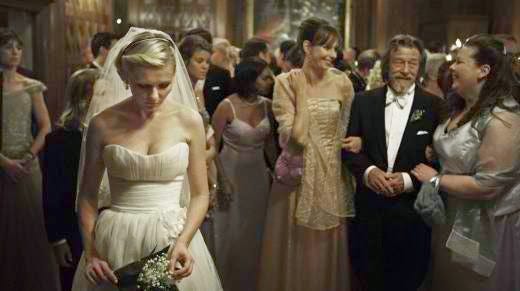
A similar arc occurs in Melancholia, which shares many of the same bourgeois characteristics as Damage. Repression and the pressures of conformity are omnipresent in the film’s first half, but Von Trier narrows in much more heavily on the idea of social rituals, devoting this entire section of his film to depicting a wedding and studying how a bourgeois community acts and interacts during such a ritual. There is a dark, underlying sarcasm to the wedding sequence, as Von Trier seems to quietly mock the notion of ‘celebration’ being ritualized. These people do not attempt to find and maintain happiness organically, but to will it into being through speeches, fine dining, ritualized dancing, and arbitrary party games (such as the bean jar and the paper floats). They emphasize communal happiness – all these rituals must be observed in a group, and isolation is considered anti-social – while simultaneously deemphasizing individual expression of any emotion.
Like Stephen, protagonist Justine is compelled early on to begin rebelling. As with Stephen, it does not appear to be a decision she consciously, logically arrives at, but a compulsive action to escape from the restrictive monotony of her social strata. When she flees to the golf course to pee, or locks herself in the bathroom to take a bath, or cheats on her new husband with a fellow employee (also on the golf course – another realm of bourgeois arbitrary significance), she is compelled to do so by the transgressive energy that is created inside her by the society she is forced to inhabit. That energy is a fundamentally compulsive one, and as with Stephen, it is directed back at the society that fostered it; much of her behavior during the wedding is profoundly antisocial in the truest sense of the word – what she does is diametrically opposed to the fundamentals of bourgeois culture.
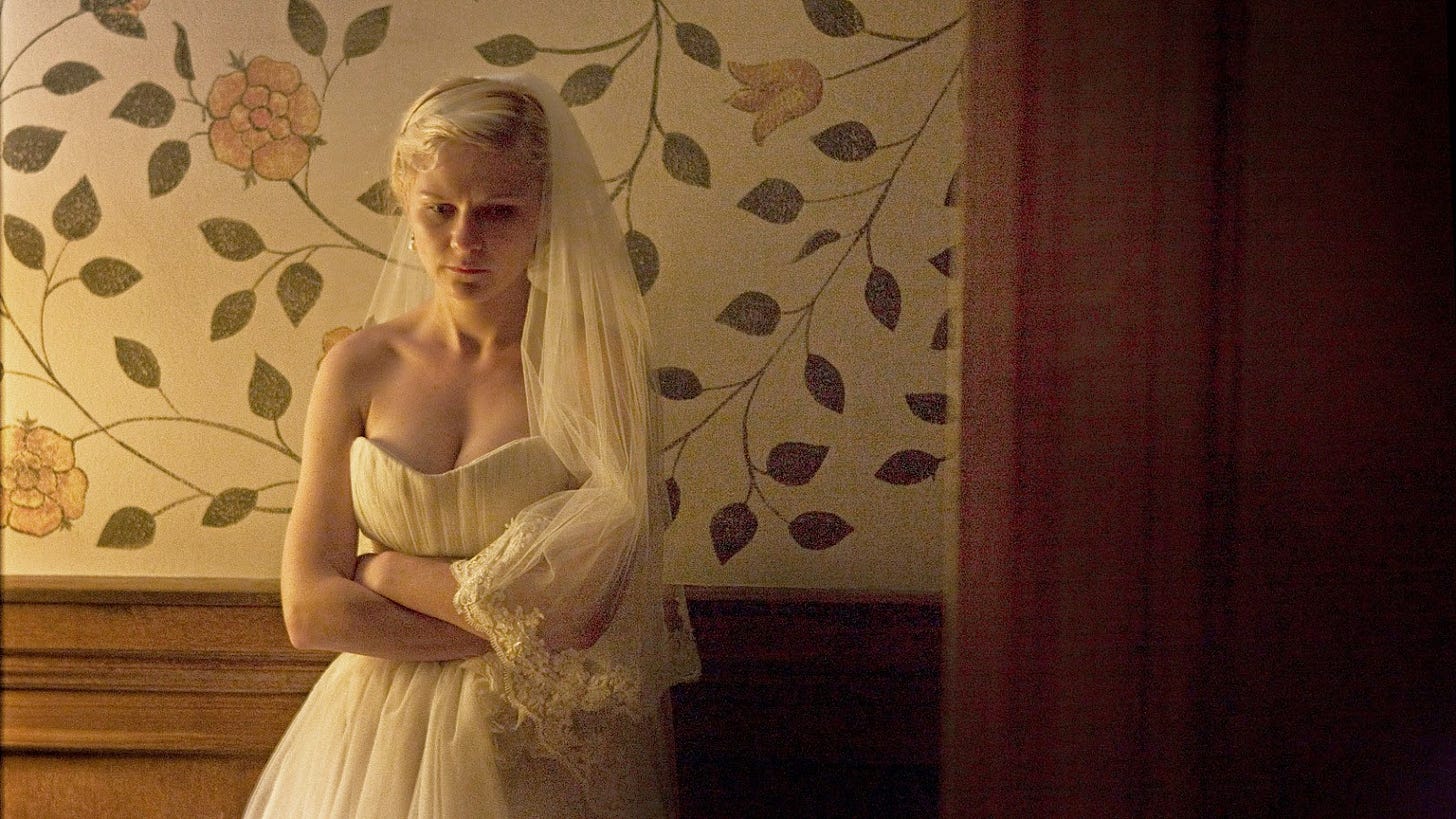
As in Damage, the direction of the transgressive energy’s flow is also eventually reversed, though it is a bit more complex in Melancholia. Justine is, of course, compelled by a further internal energy – clinical depression, a clear form of mental illness – and the reversal of transgressive energy in Melancholia comes from the bourgeois society not only failing to recognize Justine’s mental problems, but refusing to treat them legitimately or sensitively. All those who go to the wedding reject Justine at one point or another – her husband and father both leave, her sister’s husband John (Keifer Sutherland) is cruel and mocking, and even her loving sister Claire (Charlotte Gainsbourg) becomes fed up and angry at one point – which is, in itself, a transgression. All fail to treat Justine fairly, and each refuses to accept the individual characteristics that make her the way she is, instead wanting her to conform to their deeply ingrained social norms. In so doing, they redirect the transgressive energy she sends towards the bourgeois back upon Justine.
The transgressive energy in Melancholia is much more fluid than it is in Damage, constantly being traded back and forth between Justine and the others in an increasingly feverish cycle of abuse, until a third social force enters the picture. The eponymous planet, appearing in the sky after hiding behind the sun, inflicts its own transgressive energy – eventually consuming and destroying the Earth, and the bourgeois along with it – and it inflicts that energy directly upon the bourgeois (Justine is destroyed as well, of course, but at no point does she seem tormented or distressed by the looming threat). This is a layer of transgression that does not exist in Damage, and stems from the fact that Von Trier is more thematically explicit than Malle. We can obviously sense, in Damage, that Malle is highly critical of bourgeois culture, but Von Trier takes his criticism a step further by introducing this new cosmic element, and bringing destruction down upon the culture that births and fosters so much negative, transgressive energy. To Justine, the planet is therefore a force of justice. “The Earth is evil,” she says. “We don’t need to grieve for it ... Nobody will miss it.” What she sees is a wicked, repressive society, preserved throughout time and history on our planet, being deprived of any further opportunity to create misery or to transgress. And given Justine’s insistence that “life is only on Earth,” meaning that Earth’s apocalypse is the end of all life, one could extend Von Trier’s argument past social boundaries to existence itself – despair and transgression being such integral parts of all life that the absolute erasure of existence is, in some sense, a cause for celebration.

Malle’s vision is one of bourgeois culture, and transgressive energy, perpetuating itself indefinitely; Von Trier’s is a fantasy in which that perpetuation is permanently and irrevocably ceased. Either way, the conclusion we may draw from both films is that bourgeois culture is fundamentally dangerous, for in maintaining rigid, non-individualistic social structures, it constantly deemphasizes, ignores, and even erases the individual, leading to an ingrained transgressive energy that is inevitably destructive. Those who live within these social boundaries are bound to destroy or be destroyed, because this energy is always fostered inside them, compounded with each observed social ritual, each bit of conformity, and each moment of continued emotional repression.
Read All 'Essay Day' Entries Here:
#1 – Heart of the Tramp: Charlie Chaplin’s Ethic of Dignity
#2 – Absolute Contingencies: The Double Life of Veronique, Under the Skin, Proteus, and the Wonder of Internalizing Art
Jonathan R. Lack has been writing film and television criticism for ten years, for publications such as The Denver Post’s ‘YourHub’ and the entertainment website We Got This Covered, and is the host of The Weekly Stuff Podcast with Jonathan Lack and Sean Chapman. His first book – Fade to Lack: A Critic’s Journey Through the World of Modern Film – is now available in Paperback and on Kindle. Follow him on Twitter @JonathanLack.

